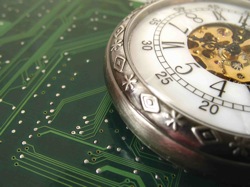A magazine where the digital world meets the real world.
On the web
- Home
- Browse by date
- Browse by topic
- Enter the maze
- Follow our blog
- Follow us on Twitter
- Resources for teachers
- Subscribe
In print
What is cs4fn?
- About us
- Contact us
- Partners
- Privacy and cookies
- Copyright and contributions
- Links to other fun sites
- Complete our questionnaire, give us feedback
Search:
Fancy some Green chips?

It's a documented fact that many species are disappearing as a result of pollution, environmental changes, and expansion into natural ecosystems. If we are to continue our progress and maintain an environmental balance, especially in light of climate change, we need new solutions to these problems. There are many ways future creative computer scientists might play a role, from devising algorithms that control how we harness natural energy efficiently, thinking of ways to reduce the energy usage of the technology itself, to coming up with new technologies that change the way we behave, such as developing the ways we use the virtual world to avoid the need to travel in the real world.
Energy efficiency has been important for a long time: Back in 1992 the US Environmental Protection Agency introduced a voluntary labelling program, called Energy Star, designed to help encourage energy-efficiency in monitors and other technologies. This scheme led to the widespread use of sleep mode among consumer electronics. Of course now we need to go a step further and stop our lazy ways of leaving gadgets in sleep mode when we know we aren't going to use them for a while rather than switching them off!
Today, energy efficiency is a vital part of any new technology. For example, computer scientists and engineers at Intel are working to try and make your chips cooler. The silicon chip in your laptop or mobile phone needs electricity to work. The chip (or processor) is made up of thousands of microscopic electronic switches that allow the computer program to do the calculations to make your application work. Normally all these switches click over at the same time. It's called a clock cycle. Your data goes in. Click. The data is processed. The data comes out. The problem is that these chips, particularly if they run quickly by having a high speed clock, get very, very hot. This heat is due to the current in the circuits which causes the materials to heat up. All this heat shortens you battery life and is very inefficient.
Intel's cunning plan is to build a chip that adapts. It's called SpeedStep technology. When not much is going on, the clock runs slowly conserving your battery. Only when lots of data needs processing does the chip turn the clock speed up. This clever chip is just one way that today's computer scientists are trying to build eco-friendly computers, and produce chips that wont fry your battery.


